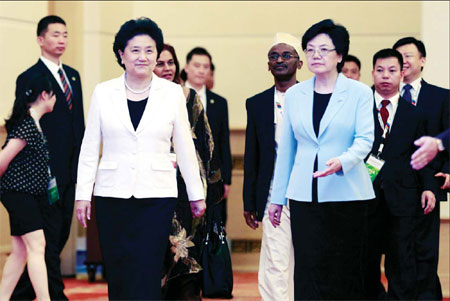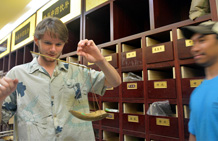
Healing agents
Source:China Daily
Todd Balazovic and Li Aoxue
Updated: 2013-08-23
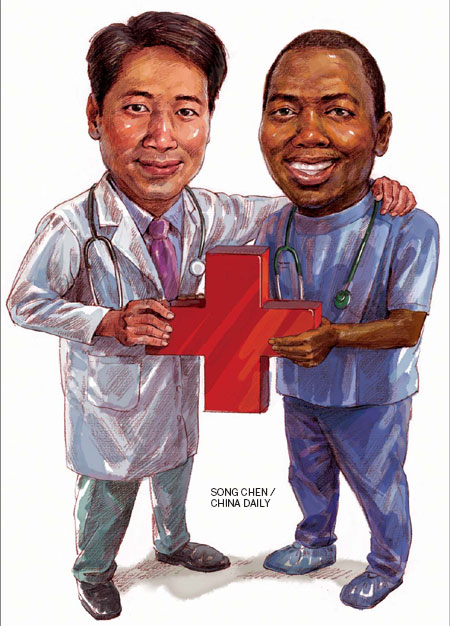
|
Vice-Premier Liu Yandong (left) walks with delegates during the opening ceremony of the Ministerial Forum of China-Africa Health Development at the Great Hall of the People in Beijing on Aug 16. Feng Yongbin / China Daily |
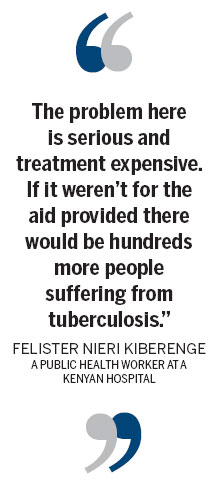
Fifty years after China sent its first overseas medical team to Africa it has renewed its commitment to the continent
China's pledge to continue working with African countries to promote public health is being seen as a shot in the arm to efforts to tackle some of the world's most persistent health problems.
President Xi Jinping made the pledge in Beijing on Aug 16 following the Ministerial Forum on China-Africa Health Development.
Half a century of the two working together on health issues would continue, Xi told government delegates from 48 African countries and health officials from around the world. He hoped the forum would "substantially push forward health cooperation".
"Human development is the core of development", Xi said.
Michael Sidibe, executive director of UNAIDS, told Xinhua News Agency after Xi's announcement: "I believe China-Africa cooperation on health has the potential to bring huge benefits to the lives of millions of Africans and solve some of the most intractable health problems in human history."
Issues covered at the Beijing meeting included malaria, schistosomiasis, HIV/AIDS, reproductive health, immunization and vaccine preventable diseases.
"This is a very important session," Michael O'Leary, the World Health Organization's top health representative, said during the forum.
"Non-communicable diseases are a big problem not only in China but everywhere in the world. Fortunately we've gained a lot of experience over time."
As China seeks to increase trade with Africa, efforts to foster the relationship in other areas have intensified.
China has a much better understanding than many Western countries of how to tackle the kinds of health problems Africa faces, having successfully done so itself over the past 50 years.
"Different countries have different strengths in the medical field," Zambia's Minister of Health, Joseph Kasonde, told China Daily.
"We therefore would like to learn from each country's own strength."
"The UK, for instance, has a quite established (National Health Service), so we seek cooperation in better understanding that. The US is quite good at producing medical equipment."
Outside assistance has played a key role in promoting public health in Africa for many years, but China has been unique in the way it has handled its technological exchanges and distribution of aid.
The outstanding characteristic of China's contribution has been its provision of human resources professionals in specific fields helping to treat patients and train local doctors.
The arrival of a Chinese medical team in Algeria in 1963 was part of an effort by China to establish diplomatic dialogue on the continent. It was the first time China had sent an overseas medical mission in modern history.
"At the time, Chairman Mao realized that China and the Chinese people knew almost nothing about Africa," says Professor Li Anshan, director of the Institute of Afro-Asian Studies and Center for African Studies at the School of International Studies at Peking University.
"He wanted to change that. These academic and medical exchanges were a way for China to seek mutually beneficial relations with Africa and find out more about the continent."
When the Chinese teams arrived they found countries that faced many of the same challenges as China.
The country's early work in Africa generated a relationship of much more give and take compared with what the continent had experienced with Western countries.
Since the arrival of the Chinese mission in Algeria in 1963, China has provided 23,000 medical specialists to 66 countries and regions globally, treating about 270 million people in Asia, Africa, Latin America and Oceania, the National Health and Family Planning Commission says.
More than 65 percent, or about 15,000, of the medical workers have been to Africa, treating 180 million people. About 1,200 Chinese medical personnel now work in 42 African countries.
The typical Chinese medical team consists of about 20 members who commit to work on site for two years, longer than aid workers from most other countries.
"China has contributed a lot in the perspective of helping us train medical staff, build hospitals, provide medical supplies and teach us hospital management," Kasonde says.
In addition to China sending medical teams to Africa, the continent's nurses and health workers are increasingly traveling to China to receive training.
Jokha Issa Khamis, 53, a nurse from Tanzania, who attended the China Health Forum, finished a training course in Shandong province recently. She spent three months studying advanced techniques in treating patients with cataracts, and two of her compatriots, both surgeons, did surgery training.
"Because of the aging issue, there are many patients with cataracts in Tanzania," Khamis says.
"By coming here I hope I can use the knowledge to benefit my people."
Much of Tanzania's aging population is not covered by any form of social security, and health problems associated with age, such as cataracts, have become a serious issue for it and many other African countries.
In addition to the resources being devoted to the main health categories, a great deal of effort is being poured into treating cataracts, and more than 1,000 surgeries have been performed by Chinese medical staff in Africa over the past two years.
China's experience with cataracts has proved invaluable to many African countries. While many Western countries can offer advanced techniques to help prevent and treat early-stage cataracts. China's tackling the problem at home in the 1960s and 70s equipped it to deal with much more serious cases.
Pulmonary tuberculosis, which has been contained in the Western world for decades, is another area where China's know-how has been beneficial to Africa.
Following the SARS outbreak in 2003, China poured vast resources into controlling TB and in just over two years increased the detection rate from 30 percent to 80 percent.
TB is still prevalent in China, but the country's rapid response and understanding has provided a source of information for many countries across the horn of Africa, where TB is most prevalent.
At a hospital in Kenya, Felister Nieri Kiberenge, a public health worker, uses Chinese-made equipment to help combat the respiratory disease.
In Beijing to talk to specialists and receive training in using advanced medical devices, she says China has played a vital role in stemming the incidence of the disease.
"The problem is serious and treatment expensive. If it weren't for the aid provided there would be hundreds more people suffering from tuberculosis."
However, exchanges between China and Africa are not one-way, and one area in which that is evident is in the treatment of HIV/AIDS.
Kasonde says: "We believe China can learn from Zambia's experience in HIV/AIDS prevention as well as how to work in conditions where there is a lack of medicine and equipment."
While those two things, in addition to knowledge, are invaluable tools in public healthcare, money is obviously another, and China has been able to provide more of it as its economy has grown over the years.
China announced recently that that the length of stay for Chinese medical teams will be shortened, and human resources sent to African countries may soon focus more on infrastructure.
There has been a proliferation of medical construction projects across the continent, and over the past seven years China has built 30 new hospitals and malaria treatment centers and there are plans for more.
In March, during President Xi's first overseas trip after he took office, he visited a newly inaugurated hospital in the Republic of Congo that was built and equipped using Chinese money.
However, providing the latest in medical equipment is just one strand of China's aid, another being cheap natural healing drawing on the benefits of traditional Chinese medicine.
China's ability to provide affordable medicine, particularly to treat malaria, has helped treatment reach people in many countries who would otherwise not have had access.
In addition to opening treatment centers, inexpensive Chinese anti-malarial drugs using artemisinin, found in the wormwood tree, have become a drug of choice.
Artemisinin has been used in traditional Chinese medicine for centuries to treat fever, headache and dizziness, but it was not until 1971 that scientists demonstrated its anti-malarial properties.
Since the discovery of the Asia-native wormwood tree's curative properties, it has been introduced and grown worldwide.
Just as traditional Chinese medicine can provide inexpensive alternatives, in many cases more modern medical techniques and facilities can save a country millions, as has been the case in Botswana.
"Previously when we encountered diseases we were not able to handle, we paid millions and millions to South African specialists," John Seakgosing, the country's minister of health, says.
"After Chinese teams came, we were able to perform many surgeries which we had to previously ask the South African specialists to do. It was quite a relief for our country. It could be considered that the coming of Chinese teams not only had a medical impact, but also an economic impact."
In Botswana, where GDP is $17.3 billion, offsetting millions worth of inefficient medical costs can have a large impact, he says.
Now Botswana is looking at developing traditional Chinese medicine exchanges and pharmaceutical trade with China.
"As we don't produce medicine of our own, we are looking forward to the assistance Chinese pharmaceutical companies can provide us. Africa, too, has traditional medicine, but it is quite undeveloped. As traditional Chinese medicine is quite developed we look forward to the help they can provide in developing our own."
As in China, where traditional Chinese medicine is used as a cost-effective first line of defense against minor illnesses, Seakgosing says he hopes a similar form of medication can become available.
Providing pharmaceuticals and Chinese equipment to treat Africa's 1 billion people could mean not only big business, but also career opportunities.
One of those hoping to cash in on that potential is Immanuel Konteh, 19, from Sierre Leone, who attended the forum in Beijing.
Konteh, who has been in Beijing for six months completing a master's degree in engineering and learning Mandarin, says that with China's closer ties with Africa in health, adapting his degree to the medical field would guarantee him a job when returning home.
"The medical field is a very good place to work in Africa Jobs are in high demand and generally the pay is good."
Contact the writers at toddbalazovic@chinadaily.com.cn and liaoxue@chinadaily.com.cn
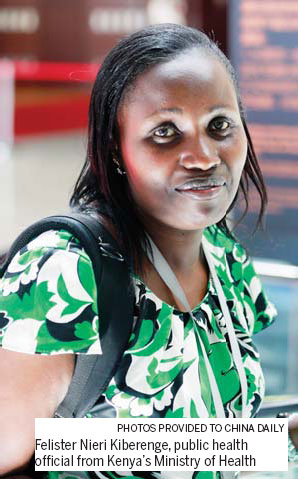
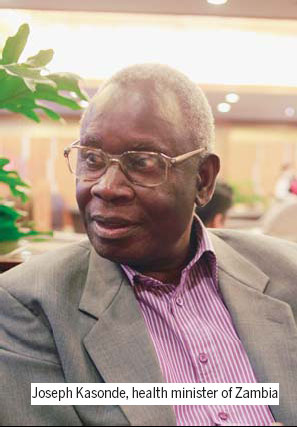
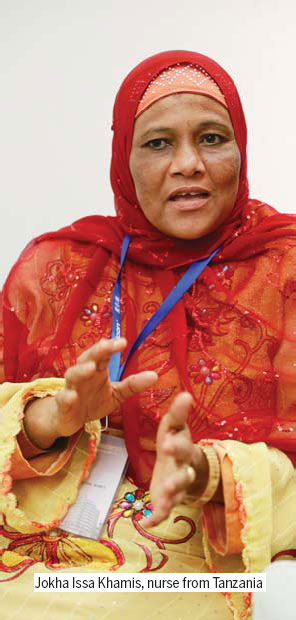
(China Daily Africa Weekly 08/23/2013 page1)

World Family Summit
The World Family Organization was founded in Europe in 1947 and headquartered in Paris.
Link: China's Central Government / World Health Organization / United Nations Population Fund / UNICEF in China
Copyright 2014 National Health and Family Planning Commission of the PRC All rights reserved



